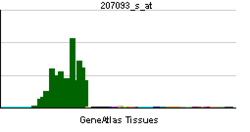OMG (gene)
| OMG | ||||||
|---|---|---|---|---|---|---|
| Identifiers | ||||||
| Aliases | OMG, OMGP, oligodendrocyte myelin glycoprotein | |||||
| External IDs | MGI: 106586 HomoloGene: 36099 GeneCards: OMG | |||||
| RNA expression pattern | ||||||
 | ||||||
| More reference expression data | ||||||
| Orthologs | ||||||
| Species | Human | Mouse | ||||
| Entrez | ||||||
| Ensembl | ||||||
| UniProt | ||||||
| RefSeq (mRNA) | ||||||
| RefSeq (protein) | ||||||
| Location (UCSC) | Chr 17: 31.27 – 31.3 Mb | Chr 11: 79.5 – 79.5 Mb | ||||
| PubMed search | [1] | [2] | ||||
| Wikidata | ||||||
| View/Edit Human | View/Edit Mouse |
Oligodendrocyte-myelin glycoprotein is a protein that in humans is encoded by the OMG gene.[3][4][5]
References
- ↑ "Human PubMed Reference:".
- ↑ "Mouse PubMed Reference:".
- ↑ Viskochil D, Cawthon R, O'Connell P, Xu GF, Stevens J, Culver M, Carey J, White R (Mar 1991). "The gene encoding the oligodendrocyte-myelin glycoprotein is embedded within the neurofibromatosis type 1 gene". Mol Cell Biol. 11 (2): 906–12. PMC 359746
 . PMID 1899288.
. PMID 1899288. - ↑ Mikol DD, Alexakos MJ, Bayley CA, Lemons RS, Le Beau MM, Stefansson K (Mar 1991). "Structure and chromosomal localization of the gene for the oligodendrocyte-myelin glycoprotein". J Cell Biol. 111 (6 Pt 1): 2673–9. doi:10.1083/jcb.111.6.2673. PMC 2116377
 . PMID 2277079.
. PMID 2277079. - ↑ "Entrez Gene: OMG oligodendrocyte myelin glycoprotein".
Further reading
- Mikol DD, Gulcher JR, Stefansson K (1990). "The oligodendrocyte-myelin glycoprotein belongs to a distinct family of proteins and contains the HNK-1 carbohydrate.". J. Cell Biol. 110 (2): 471–9. doi:10.1083/jcb.110.2.471. PMC 2116011
 . PMID 1688857.
. PMID 1688857. - Mikol DD, Stefansson K (1988). "A phosphatidylinositol-linked peanut agglutinin-binding glycoprotein in central nervous system myelin and on oligodendrocytes.". J. Cell Biol. 106 (4): 1273–9. doi:10.1083/jcb.106.4.1273. PMC 2115011
 . PMID 3283151.
. PMID 3283151. - Maruyama K, Sugano S (1994). "Oligo-capping: a simple method to replace the cap structure of eukaryotic mRNAs with oligoribonucleotides.". Gene. 138 (1–2): 171–4. doi:10.1016/0378-1119(94)90802-8. PMID 8125298.
- Mikol DD, Rongnoparut P, Allwardt BA, et al. (1993). "The oligodendrocyte-myelin glycoprotein of mouse: primary structure and gene structure". Genomics. 17 (3): 604–10. doi:10.1006/geno.1993.1379. PMID 8244377.
- Suzuki Y, Yoshitomo-Nakagawa K, Maruyama K, et al. (1997). "Construction and characterization of a full length-enriched and a 5'-end-enriched cDNA library". Gene. 200 (1–2): 149–56. doi:10.1016/S0378-1119(97)00411-3. PMID 9373149.
- Wang KC, Koprivica V, Kim JA, et al. (2002). "Oligodendrocyte-myelin glycoprotein is a Nogo receptor ligand that inhibits neurite outgrowth". Nature. 417 (6892): 941–4. doi:10.1038/nature00867. PMID 12068310.
- Strausberg RL, Feingold EA, Grouse LH, et al. (2003). "Generation and initial analysis of more than 15,000 full-length human and mouse cDNA sequences". Proc. Natl. Acad. Sci. U.S.A. 99 (26): 16899–903. doi:10.1073/pnas.242603899. PMC 139241
 . PMID 12477932.
. PMID 12477932. - Vourc'h P, Moreau T, Arbion F, et al. (2003). "Oligodendrocyte myelin glycoprotein growth inhibition function requires its conserved leucine-rich repeat domain, not its glycosylphosphatidyl-inositol anchor". J. Neurochem. 85 (4): 889–97. doi:10.1046/j.1471-4159.2003.01764.x. PMID 12716421.
- Gerhard DS, Wagner L, Feingold EA, et al. (2004). "The status, quality, and expansion of the NIH full-length cDNA project: the Mammalian Gene Collection (MGC)". Genome Res. 14 (10B): 2121–7. doi:10.1101/gr.2596504. PMC 528928
 . PMID 15489334.
. PMID 15489334. - Venturin M, Moncini S, Villa V, et al. (2007). "Mutations and novel polymorphisms in coding regions and UTRs of CDK5R1 and OMG genes in patients with non-syndromic mental retardation". Neurogenetics. 7 (1): 59–66. doi:10.1007/s10048-005-0026-9. PMID 16425041.
- Douglas J, Cilliers D, Coleman K, et al. (2007). "Mutations in RNF135, a gene within the NF1 microdeletion region, cause phenotypic abnormalities including overgrowth". Nat. Genet. 39 (8): 963–5. doi:10.1038/ng2083. PMID 17632510.
This article is issued from Wikipedia - version of the 6/3/2016. The text is available under the Creative Commons Attribution/Share Alike but additional terms may apply for the media files.